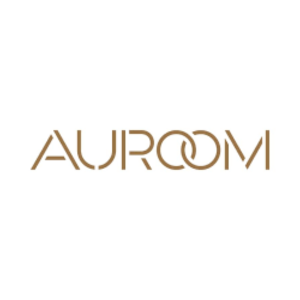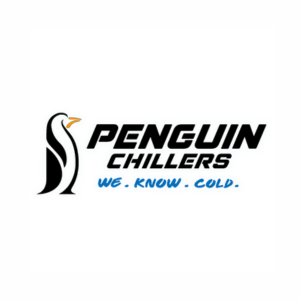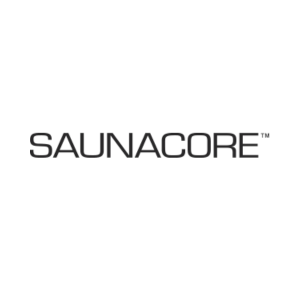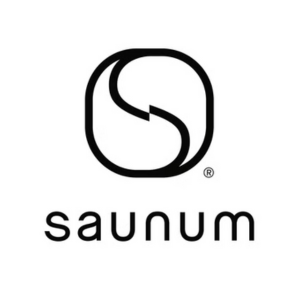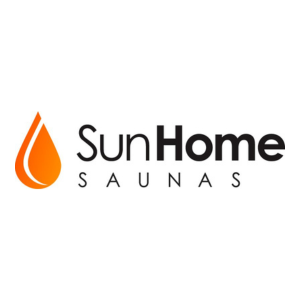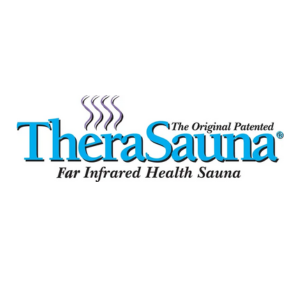SAUNA ECZEMA: EVERYTHING YOU NEED TO KNOW
Eczema can really be a debilitating condition. The constant battle with itchy and inflamed skin can leave you in discomfort, making it difficult for you to perform daily tasks.
Fortunately, a sauna session can be a game-changer for managing your eczema symptoms. Renowned for their myriad health benefits, saunas are becoming an increasingly popular way to soothe and heal the skin from within.
The question is, what's the science behind this 'hot' trend? What exactly happens to your skin when you laze around in a sauna? How can you make the most of your sauna experience so that it's beneficial for your skin?
In this article, we'll answer all these sauna eczema-related questions and more.
What Is Eczema and How Does It Affect You?
National Eczema Association describes eczema as a chronic skin condition that causes inflammation, redness, itching, and sometimes blistering or peeling on the skin. It often appears on the face, hands, feet, elbows, knees, or scalp.
Some common symptoms of eczema include:
-
Itchy or inflamed skin
-
Dry or rough skin
-
Red or brownish patches
-
Small, raised bumps that may leak fluid
-
Scaly or cracked skin
-
Sensitive or swollen skin
All these symptoms can lead to sleepless nights, discomfort during the day, and a hit on one's self-esteem.
Causes of Eczema
While the exact cause of eczema is a bit of a mystery, it is believed to be generally triggered by a combination of genetic and environmental factors.
These can include:
-
A weakened immune system with filaggrin deficiency
-
A family history of eczema, asthma, or hay fever
-
Climatic changes
-
Exposure to allergens, irritants, or substances that can affect the skin's natural barrier. This includes body wash, laundry detergent, surface cleaners, metal (especially nickel), glue, and temporary tattoos.
Types of Eczema
Each individual will experience eczema differently, and the disorder has multiple types.
Here are six common types:
-
Atopic Dermatitis is the most common form of eczema, often starting in childhood. It's characterized by itchy, inflamed skin.
-
Contact Dermatitis: This form of eczema develops when your skin comes into contact with an allergen or irritant, such as harsh soaps and chemicals. Although the symptoms of this type are pretty familiar with atopic dermatitis, it differs in that environmental factors often trigger it.
-
Nummular Eczema is characterized by coin-sized, circular inflamed skin patches. These spots can be red, scaly, or blistering.
-
Stasis Ulcers: This eczema happens because of poor circulation in the lower legs, resulting in itchy skin with brown or red patches.
-
Dyshidrotic Eczema: This form of eczema causes blisters mainly on the edges of your fingers, toes, palms, and soles of your feet which may crack open and bleed.
-
Seborrheic Dermatitis: This eczema affects the scalp, causing scaly skin and dandruff-like flakes in your hair.
Eczema is an incurable skin condition, but there are many over-the-counter medications and treatments that can help control flare-ups.
If you're looking for a more natural approach to alleviate discomfort or manage the symptoms of eczema, consider supplementing your skincare routine with sauna bathing.

Sauna Types And Working Mechanism
Before diving into how sauna bathing could help manage eczema, let's look at different types of saunas available on the market.
Traditional Saunas
Also known as Finnish saunas, traditional saunas like Almost Heaven Himalaya Sauna use a stove to heat rocks to high temperatures — usually between 150 to 195 degrees Fahrenheit. When water is thrown over the rocks, it creates steam, which is then released into the sauna room.
The high temperature and steam offer many health benefits. It can help increase blood circulation, decrease sinus congestion, soothe skin, and reduce the risk of heart attack and blood pressure.
Infrared Saunas
Unlike traditional saunas, infrared saunas use a different heating mechanism. Rather than using steam, these saunas use infrared light waves to heat your body directly. Infrared saunas typically operate at lower temperatures of around 110 to 140 degrees Fahrenheit, which some people may find more tolerable and comfortable.
Since these saunas offer a more direct heat transfer, they can relieve joint pain, alleviate symptoms of fibromyalgia and chronic fatigue syndrome, and enhance skin health.
Sauna Use and Eczema
Saunas have been enjoyed for centuries by people looking to improve circulation, relax, and rejuvenate their bodies. As your body temperature increases during a sauna session, you start sweating profusely.
It helps flush out toxins, heavy metals, and other impurities hiding beneath the skin. While these effects might seem like a game changer for those who want to amp up their skincare game, let's focus on how saunas might relieve eczema sufferers.
Research shows that sauna bathing can help remove hyperkeratotic scales in psoriasis while using petrolatum, emollient creams, or topical antipsoriatic treatments can alleviate other skin issues.
The sauna's heat has also been proven to kill off dermatophytes and other infection-causing microorganisms. Therefore, if you're suffering from contact dermatitis, you can take a sauna session to get much-needed relief rather than itching yourself to the point of bleeding.
Another 2017 study published in The Korean Journal of Clinical Laboratory Science further revealed that light therapy reduced skin thickness, allergy-related cells, and dead cells that had accumulated in the epidermis (the upper layer of the skin).
What does this mean for you? Simply put: If your skin has been acting up due to a recent eczema flare-up, you can step into an infrared sauna and bask in the red chromotherapy light to reduce inflammation, itchiness, and skin lesions.
Studies have demonstrated that infrared rays can help boost collagen production and cell regeneration, leading to healthier, more resilient skin. The heat has also been shown to increase skin permeability. This could improve the absorption rate of your topical corticosteroids and eczema ointments, making them even more effective.
Regardless of your sauna, it's always best to chat with your healthcare provider or dermatologist before diving in.

Precautions for Eczema Patients Using Sauna
Since high heat and humidity can potentially aggravate eczema symptoms, taking a few precautions while enjoying a sauna session is essential.
This includes:
-
Start Slow: If you're new to saunas or recently had an eczema flare-up, start with a shorter session. Try five to 10 minutes at a moderate temperature. You can always build up the duration slowly as your skin adapts.
-
Stay Hydrated: Drink plenty of water before, during, and after your sauna session to prevent dehydration which can dry out skin, exacerbating eczema symptoms.
-
Cool Down Gradually: Avoid a drastic temperature change after your time in the sauna. Give your body time to cool down naturally, or take a lukewarm shower to gradually bring your body temperature down.
-
Moisturize: After your sauna session, your skin may feel dry. Apply a generous amount of a gentle, fragrance-free moisturizer to your damp skin. It will help seal in the moisture.
-
Protect Your Skin: Consider using a clean, dry towel to sit or lie on in the sauna to avoid direct contact between your skin and the hot surfaces, which could potentially irritate your eczema.
-
Listen to Your Body: Your body knows best. If you feel overheated or itchy while using the sauna, it's okay to take a break or stop altogether. Always prioritize comfort over the duration.
-
Seek Medical Advice: If you're unsure whether saunas are safe for your specific situation or if your skin's reaction worries you after a sauna session, don't hesitate to consult your healthcare provider.

FAQs
Is sweating good for eczema?
Sweating is a natural moisturizer providing essential hydration for your skin. However, the story might be a bit more complex for those with eczema.
In many cases, the salts that are released with sweat can actually be irritating to eczema patches, potentially worsening symptoms. While not outright harmful, sweat isn't necessarily a bonus for people with eczema.
Are saunas good for skin problems?
Yes, indeed! The heat from the sauna can help cleanse your pores by removing dry, dead skin cells. This helps reduce skin inflammation and minimize the persistent itch accompanying eczema and psoriasis.
Furthermore, saunas can improve blood circulation to the skin, alleviating acne, reducing redness, and promoting a glowing complexion.
Can the sauna help with eczema on the hands?
Absolutely! The controlled heat of the sauna, combined with the resulting enhanced blood flow and better skin cell turnover, can potentially provide some much-needed relief for eczematous hands.

Sauna Eczema: Conclusion
Dealing with eczema can be a challenging journey, whether you're battling the persistent itch-scratch cycle or trying to keep flare-ups under control. Thankfully, saunas can help reduce inflammation, promote better circulation, and provide an overall relaxing experience that might alleviate eczema symptoms.
At MySaunaWorld, we have a wide range of premium-quality traditional and infrared saunas that can be installed anywhere in your home. For more information, contact us. Our friendly staff would be more than happy to help you find the perfect model for your needs.
SIGN UP. SAVE BIG.
Subscribe to be the first to know about our special monthly sauna sales, sent right to your inbox.

About the Author
Adam Fromson
Adam Fromson, co-founder of My Sauna World, loves saunas and their transformative health benefits. With years of experience exploring sauna culture and its impact on health and wellness, Adam is passionate about helping others discover the life-changing benefits of saunas for themselves.
Let customers speak for us
from 386 reviews
Good communication, easy delivery, easy set up, easy operation, great value. Recommended!
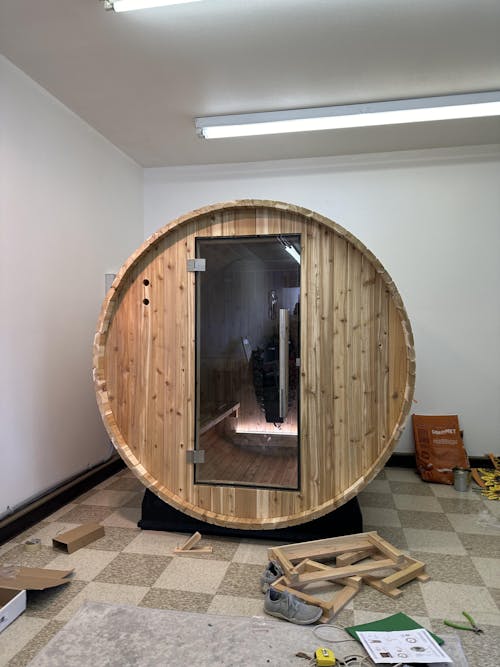
We ordered the 4 person barrel sauna and love it! We wanted a little extra space for the 2 of us/guests and it’s great. We could definitely fit 4 people in it if we needed. We use it every single day. It took about 10 weeks to get here because they build it specifically for the order. Putting the barrel together was fairly easy with 2 people. The electrical and the heater definitely required an electrician to install as we could have not done it alone.
We ordered the biggest heater (harvia spirit 8kw) and it heats up the sauna in about 15 mins inside our 40-50° garage. Overall this style of sauna is hotter and you sweat a lot faster than in an infrared sauna. I truly 10/10 recommend!
Pic is of us in the middle of building it.
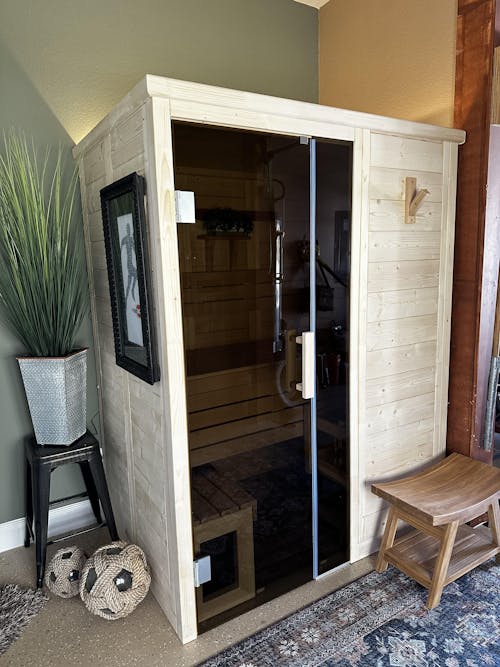
Took me about 6 hours over 2 evenings to assemble almost all by myself. Had a pro run a new circuit from my panel. Very well made and assembly was straightforward. Heater is well sized and reaches operating temperature in under 30 minutes.
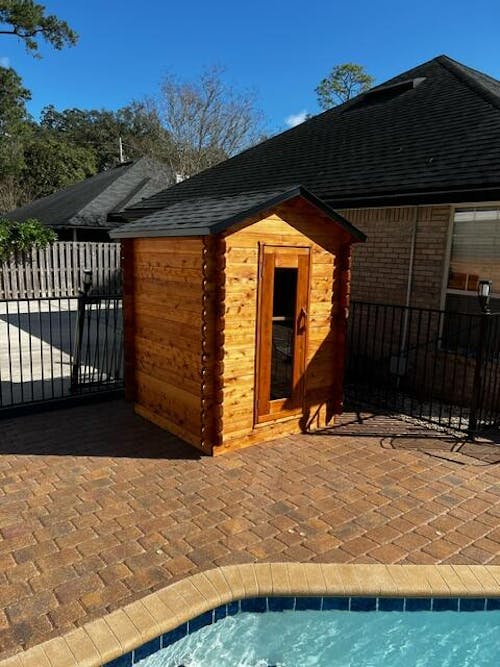
Great sauna very easy to assemble
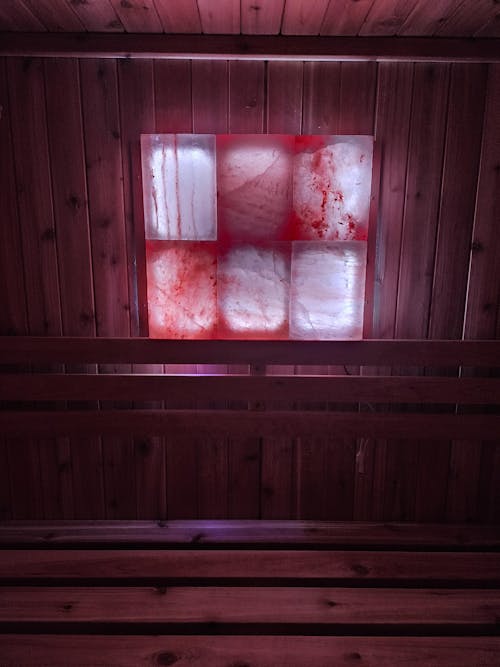
The salt panel was a great addition to our Madison Sauna. It has excellent grain which is accented by the amazing color lights that glow through the panel. Also when you hit the rocks with a splash of water you can feel the heat bounce off the panel. Great addition if you are considering this option.
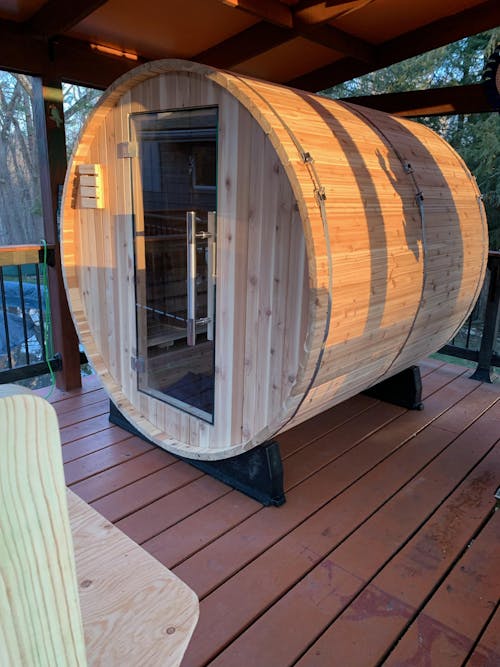
We can say enough about Sauna World there customer support is great! Our Pinnacle Sauna from Almost Heaven is epic.
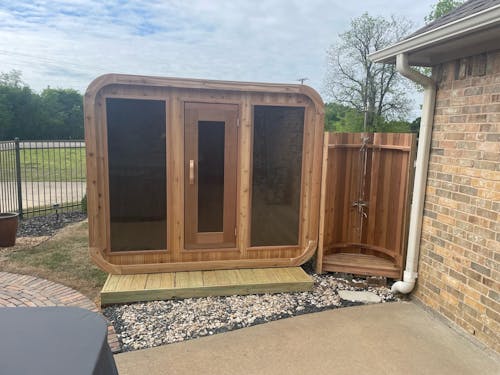
The finish and quality is outstanding and it was quick and easy to assemble.

We are thrilled with our mini pod!! It came well shipped and our friend assembled it in 11 hours! Wow! We cannot wait to get healthy and sauna it up!

Beautiful sauna!!! Much easier than I expected to assemble, took a total of 4 hours. Can't wait to get warm by the pool on those cool evenings. Customer service was excellent..
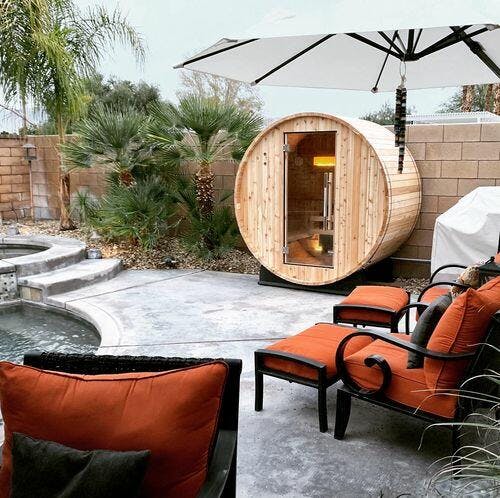
Purchased a 2 person Almost Heaven barrel sauna and were delighted with the product. The order process was quick and easy, the sauna arrived on-time, installation was simple, following the provided instructions, and the sauna is extremely high quality. We’ve used it daily for over 2 weeks and quite frankly I don’t know how we lived without it. If I had it to do over again I wouldn’t change a thing... except maybe purchasing a 4 person model to easier share with friends!

Great Customer Service and a breeze to put together.Excellent shipping and the Sauna is top notch, couldn’t be happier



